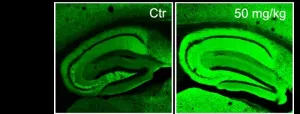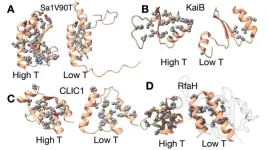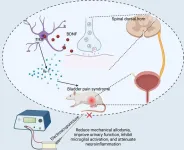(Press-News.org) In today’s economy, many workers have transitioned from manual labor toward knowledge work, a move driven primarily by technological advances, and workers in this domain face challenges around managing non-routine work, which is inherently uncertain. Automated interventions can help workers understand their work and boost performance and trust. In a new study, researchers explored how artificial intelligence (AI) can enhance performance and trust in knowledge work environments. They found that when AI systems provided feedback in real-time, performance and trust increased.
The study, by researchers at Carnegie Mellon University, is published in Computers in Human Behavior. The article is part of a special issue, "The Social Bridge: An Interdisciplinary View on Trust in Technology,” in which researchers from a range of disciplines explore mechanisms and functions of trust in people and technologies.
“Our findings challenge traditional concerns that AI-driven management fosters distrust and demonstrate a path by which AI complements human work by providing greater transparency and alignment with workers’ expectations,” suggests Anita Williams Woolley, Professor of Organizational Behavior at Carnegie Mellon’s Tepper School of Business, who co-authored the study. “The results have broad implications for AI-powered performance management in industries increasingly reliant on digital and algorithmic work environments.”
Applications of machine learning and AI have consistently proven capable of performing demanding cognitive tasks, provided they can be routinized. But in non-routine work, AI capabilities (e.g., those designed to facilitate managers’ ability to monitor productivity) often backfire, fostering enmity instead of efficiency.
In this study, researchers sought to determine how the frequency of feedback and the uncertainty of a task interacted to influence workers’ perceptions of an algorithm’s trustworthiness. In a randomized, controlled experiment, 140 men and women (primarily White and with a median age of 39) performed caregiving tasks in an online, simulated home healthcare environment.
Individuals were randomly assigned to receive or not receive automated real-time feedback (i.e., feedback delivered during the task) while performing their work under conditions of high or low uncertainty. After completing the task, they received an algorithmically determined rating based on their actual performance on the task.
Real-time feedback increased the perceived trustworthiness of the performance rating by boosting workers’ sense of their own work quality (i.e., knowledge of the results) and reducing the degree to which they were surprised by their final evaluation. This, in turn, enhanced workers’ trust in AI-generated performance ratings—particularly in non-routine work settings where uncertainty was high.
Among the study’s limitations, the authors note that their findings may not generalize to all circumstances, in part because study participants were not drawn from a population of caregivers and the simulated task did not represent actual caregiving. In addition, the study did not examine the role of individual differences, such as levels of conscientiousness and expertise.
“Non-routine work has long posed challenges to traditional management strategies, and the development of algorithmic management systems offers an opportunity to begin to address them,” notes Allen S. Brown, a PhD student in Organizational Behavior and Theory at Carnegie Mellon’s Tepper School of Business, who led the study. “Our identification of a new framework for examining managerial interventions, one that makes performance standards more transparent and increases workers’ knowledge of the results, is particularly relevant in today’s emerging work environments.”
The study was funded by the AI-CARING Project of the U.S. National Science Foundation.
END
New research explores how AI can build trust in knowledge work
2025-03-10
ELSE PRESS RELEASES FROM THIS DATE:
Compound found in common herbs inspires potential anti-inflammatory drug for Alzheimer’s disease
2025-03-10
LA JOLLA, CA—The herb rosemary has long been linked with memory: “There’s rosemary, that’s for remembrance,” says Ophelia in Shakespeare’s Hamlet. So it is fitting that researchers would study a compound found in rosemary and sage—carnosic acid—for its impact on Alzheimer’s disease. In the disease, which is the leading cause of dementia and the sixth leading cause of death in the US, inflammation is one component that often leads to cognitive decline.
Carnosic acid is an antioxidant and anti-inflammatory compound that works by activating enzymes that make up the body’s natural defense system. ...
Inhaled COVID vaccine begins recruitment for phase-2 human trials
2025-03-10
Researchers at McMaster University have started a phase-2 clinical trial on a next-generation, inhaled COVID-19 vaccine.
The AeroVax study, supported by $8M in funding from the Canadian Institutes of Health Research (CIHR), will test needle-free vaccines developed to provide protection from SARS-CoV-2.
Led by Fiona Smaill and Zhou Xing, members of the Michael G. DeGroote Institute for Infectious Disease Research (IIDR) at McMaster, the multi-centre trial will evaluate the new vaccine in a broad study group, while also confirming ...
What’s in a label? It’s different for boys vs. girls, new study of parents finds
2025-03-10
A decades-old riddle poses the following scenario: A boy is injured in a car crash in which the father dies and is taken to the emergency room, where the doctor says, “I cannot operate on him—he’s my son.” Who, then, is the doctor? Many over the years have been stumped in not recognizing the answer: the mother.
Similarly, research has shown that adults instinctively think of men when asked to think of a person—they describe the most “typical” person they can imagine as male and assume storybook characters without a specified gender are men. A new study by psychology researchers shows that the way parents ...
Genes combined with immune response to Epstein-Barr virus increase MS risk
2025-03-10
In multiple sclerosis (MS), antibodies to the common Epstein-Barr virus can accidentally attack a protein in the brain and spinal cord. New research shows that the combination of certain viral antibodies and genetic risk factors can be linked to a greatly increased risk of MS. The study has been published in the journal PNAS and led by researchers at Karolinska Institutet, Sweden, and Stanford University School of Medicine, USA.
An estimated 90 to 95 percent of adults are carriers of the Epstein-Barr virus (EBV) and have formed antibodies against it. Many become infected as children with few or no symptoms, but in young adults, the virus can cause glandular ...
Proximity and prejudice: Gay discrimination in the gig economy
2025-03-10
University of Queensland research has found discrimination based on sexual orientation is common in the gig economy, but only for tasks requiring close physical proximity.
Dr David Smerdon, Dr Samuel Pearson and Dr Sabina Albrecht ran an experiment on a popular online marketplace involving more than 1,100 job posts across 6 Australian cities.
“To test whether workers discriminate against gay men, we created hundreds of fictitious male ‘requester’ profiles, with some clearly signalling they were gay by referring to their male partner or with a couple profile photo,” Dr Pearson said.
“The requested tasks were either inside the home – such as moving ...
New paper suggests cold temperatures trigger shapeshifting proteins
2025-03-10
Metamorphic proteins can be thought of as the “shapeshifters” of human, animal and bacterial cells. Their ability to drastically switch between two different shapes enables them to adapt to changing environments and carry out diverse functions.
Little is known about how metamorphic proteins transform despite their usefulness in living organisms. To help tackle this mystery, a new paper in the “Perspectives” section of the journal Proceedings of the National Academy of Sciences (PNAS) offers a “bold theory,” said co-author John Orban, a professor in the University of Maryland’s Department ...
Reproductive justice–driven pregnancy interventions can improve mental health
2025-03-10
March 10, 2025 — Perinatal interventions guided by reproductive justice principles can have positive effects on the perinatal mental health of Black birthing patients and, perhaps, the mental health development of their infants, states a systematic review published in a special issue of Harvard Review of Psychiatry, part of the Lippincott portfolio from Wolters Kluwer.
Mental health interventions incorporating reproductive justice principles "utilize a trauma-informed approach to address the psychosocial stress and trauma of racism and their negative effects on pregnant parents and offspring," Cristiane S. Duarte, PhD, MPH, of Columbia University ...
Intranasal herpes infection may produce neurobehavioral symptoms, UIC study finds
2025-03-10
Herpes simplex virus-1 (HSV-1) is commonly known for causing blisters and sores. But in some cases, the virus can migrate to the eye or nervous system, causing severe, chronic symptoms.
Now, a study from University of Illinois Chicago researchers finds that herpes infection through the nose can lead to anxiety, motor impairment and cognitive issues. The research is the first to show that, by exploiting a cellular enzyme, the virus can produce behavioral symptoms. The finding emphasizes the need for prevention and treatment of a virus carried by billions of people worldwide.
The research, published in mBio, is the latest from the College of Medicine group ...
Developing treatment strategies for an understudied bladder disease
2025-03-10
Despite its increasing prevalence, a painful condition called bladder pain syndrome, or interstitial cystitis, remains understudied with limited treatment options. In a new eNeuro paper, Min-Zhi Su and colleagues, from Sun Yat Sen University, used a rat model of bladder pain syndrome to explore if electroacupuncture can alleviate pain and improve bladder function. Electroacupuncture nerve stimulation therapy has shown promise in treating conditions like Huntington’s disease and Amyotrophic Lateral Sclerosis, but researchers have not explored its utility in this context. The researchers discovered that this ...
Investigating how decision-making and behavioral control develop
2025-03-10
Many psychiatric disorders are linked to altered functioning of brain networks that drive reward processing and executive functions like making decisions, taking risks, planning, and memory. But a better understanding of how these networks typically develop to support reward-related executive functions is needed. New in JNeurosci, Samuel Klein and Monica Luciana, from the University of Minnesota, led a longitudinal study to explore how brain networks for reward processing and executive functioning ...


